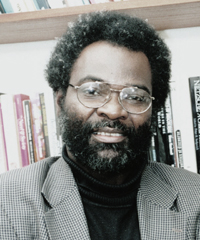










Jack Mapanje
Niyi Osundare
Lauri Kubuitsile
Peter Addo
N.Casely-Hayford
Kola Boof
Courttia Newland
Nii Kwei Parkes
Eusebius
McKaiser
Anietie Isong
Dike
Chukwumerije
Chinelo Achebe-
Ejeyueitche
Akin Adesokan
Tolu Ogunlesi
Adaobi Tricia
Nwaubani
Eghosa Imasuen
Mpalive Msiska
Roi Kwabena
Emmanuel
Sigauke
Nnedi Okoroafor-
Mbachu
George E. Clarke
Kimyia Varzi
Obemata
Uche Nduka
Amatoritsero Ede
Obododimma Oha
Leila Aboulela
James Whyle
Koye Oyedeji
Obiwu
Becky Clarke
Nike Adesuyi
Derek Petersen
Afam Akeh
Olutola Ositelu
V. Ehikhamenor
Molara Wood
Chime Hilary
Wumi Raji
Chuma Nwokolo
 |
||||||||||||
Mpalive Msiska Dr. Msiska is a Senior Lecturer in English and Humanities at the Birkbeck University of London. He is a Judge for The Caine Prize for African Writing. He has previously studied in Malawi, Canada, Germany and Scotland and has taught at the Universities of Malawi, Stirling and Bath Spa. He has published conference papers, Journal articles and books, including: Wole Soyinka, (1998); Writing and Africa (Longman, 1997) Chinua Achebe’s Things Fall Apart: A Critical Guide (Routledge, 2006) and The Quiet Chameleon: A Study of Poetry from Central Africa (Hans Zell, 1992). Forthcoming publications include, Post-Colonial Identity in Wole Soyinka, (Rodopi); He is a member of the Editorial Board of the Journal of Southern African Studies and of the Editorial Advisory Board of The Journal of African Cultural Studies. He is also an Examiner for the Commonwealth Essay Competition. |
||||||||||||
|
The term “Black-British Writing” is generally used to refer to literary texts produced by writers of African, Caribbean or Asian racial and cultural origin. The category is now employed in organising courses in Higher Education, especially in the United Kingdom, and for the publication and marketing of literary as well as critical texts in the subject area. However, like other similar literary classificatory terms, such as “Commonwealth Literature,” it has not been without its fair share of criticism. Indeed, the writer Fred D’Aguiar in an essay in Wasafiri a few years ago stated that he was opposed to the term as it was reductive of the hugely diverse concerns of the literature it purported to describe, bringing together into an incongruous composite assembly writers from radically different cultural backgrounds. Salman Rushdie had expressed similar reservations about the term “Commonwealth Literature” in his book Imaginary Homelands a few years earlier. It is clear that writers in particular do feel strongly against their work being seen largely in terms of the author’s racial biological origins instead of its intrinsic aesthetic and thematic value
|
Trees running past the window, Tickets please! Can I ask the question, The day ends as it started, I ask about the Star of Africa, They no longer fight there, |
|||||||||||